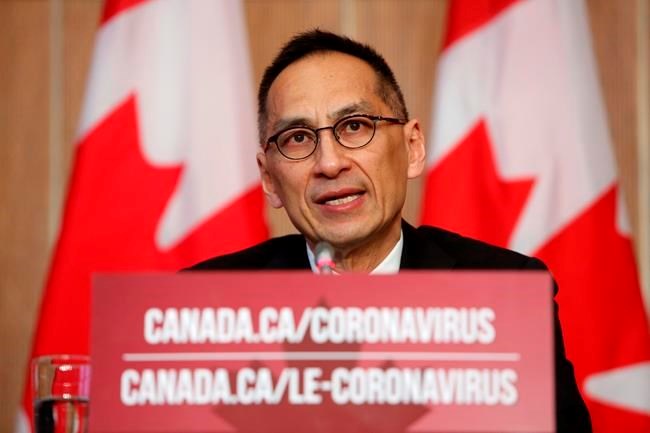OTTAWA — Canada's deputy chief public health officer says the country's Olympians can be "great role models" by getting vaccinated before the Tokyo Games.
Dr. Howard Njoo says he was part of recent discussions with the Canadian Olympic and Paralympic committees about the Games, which are scheduled to start July 23.
There has been a wave of criticism about the Games going forward in Japan.
The latest ominous sign came Thursday when a physician representing a Japanese medical body warned that holding the postponed Tokyo Olympics in two months could lead to the spread of variants of COVID-19.
Njoo says whether the Games should go forward is a question for others because it involves considerations other than "purely the public health aspects."
Njoo feels the effort to get Canadian athletes vaccinated can help encourage others to do so.
"If they were to go forward and get fully vaccinated before they go, (it would show) other young Canadians they realize and recognize the importance of getting vaccinated," Njoo said Thursday.
Athletes are not required to be vaccinated to compete in the Olympics or Paralympics.
Njoo feels good plans can help limit dangers.
"The public health risk can be mitigated," he said. "It's never zero, but it certainly can be mitigated."
The IOC and local organizers say they have been relying on the World Health Organization for public-health guidance. They say the Olympics and Paralympics will be “safe and secure,” focused on extensive testing, strict protocols, social distancing, and keeping athletes largely isolated in the Olympic Village alongside Tokyo Bay.
The IOC has said it expects more than 80 per cent of the people living in the village to be vaccinated. This contrasts with a very slow rollout in Japan where less than five per cent of the public has been vaccinated.
On Wednesday, Japan’s mass-circulation Asahi Shimbun newspaper called for the Olympics to be cancelled.
Earlier this week, the New England Journal of Medicine said in a commentary: “We believe the IOC’s determination to proceed with the Olympic Games is not informed by the best scientific evidence.”
Canada's athletes and teams, meanwhile, continue to prepare for the Games.
Canadian women's soccer coach Bev Priestman was asked Thursday whether she has any worries the Games might be cancelled or going to a country where only a small percentage of the population has been vaccinated.
"That's background noise," she said.
"To be honest with you, I've stayed out of that because I think (for) the task at hand, even for my own motivation, we have to kick on and assume it is happening, which I have every belief and my understanding is that it'll go ahead. But I think I'm really comfortable having seen the COVID protocols will be even stricter, I think, than what we've been experiencing over the last two or three camps.
"So from a health and safety perspective of our team, I feel more than comfortable based on it being even more strict. We have to prepare ourselves culturally for that, right? It might be even tougher than what is has been. So I don't worry healthy and safety-wise. And we have to plan like it will go ahead, which I do believe it will."
As of May 19, Canada Soccer has had just two positives among 1,726 COVID tests since January in its "controlled environment'' — both of which came from people reporting to camp.
-- With files from Mia Rabson in Ottawa, Neil Davidson in Toronto and The Associated Press.
This report by The Canadian Press was first published May 27, 2021.
The Canadian Press



